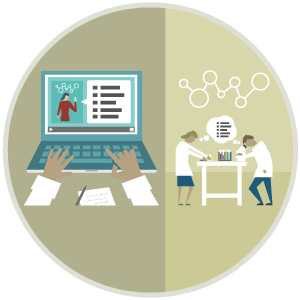Flexible learning is grounded in evidence-based, technology-enabled teaching methods that benefit student learning and engagement. This section highlights scholarly research focusing on educational innovation at the post-secondary level.
Flipped classroom
This model emphasizes engagement with course content outside of class time, and active learning in class.
Peer assessment + feedback
These activities allow students to take an active role in their learning through exercises such as peer review and critique.
Blended learning
Instructors use a blend of face-to-face and online learning, giving students more choice in when, where and how they learn.

Community engagement
UBC students partner with community members to help solve complex societal problems.
Experiential learning
Experience is placed at the forefront of the learning process as students “learn by doing.”
So which instructional mode is best?
Simon Bates, Associate Provost, Teaching and Learning, argues that “despite careful research and analysis, and in some cases meta-analyses of large quantities of published work, findings are far from definitive. The apparently simple question of ‘Which is better: face-to-face, blended or online?’ turns out to be much more complex than you might think, and is possibly not even the right question to be asking.”



